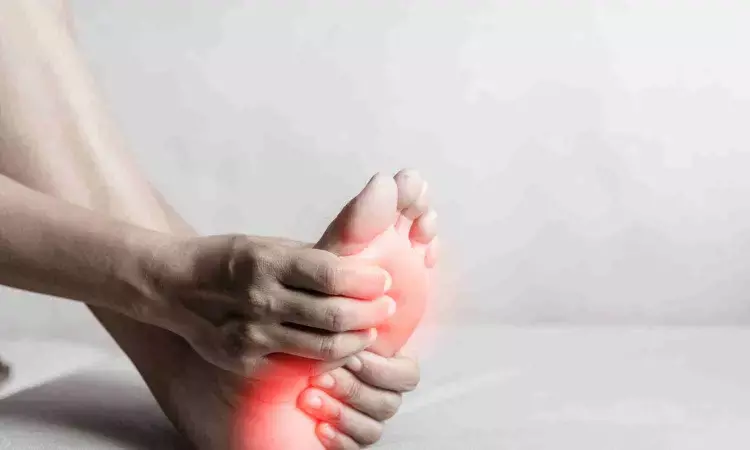- Home
- Medical news & Guidelines
- Anesthesiology
- Cardiology and CTVS
- Critical Care
- Dentistry
- Dermatology
- Diabetes and Endocrinology
- ENT
- Gastroenterology
- Medicine
- Nephrology
- Neurology
- Obstretics-Gynaecology
- Oncology
- Ophthalmology
- Orthopaedics
- Pediatrics-Neonatology
- Psychiatry
- Pulmonology
- Radiology
- Surgery
- Urology
- Laboratory Medicine
- Diet
- Nursing
- Paramedical
- Physiotherapy
- Health news
- Fact Check
- Bone Health Fact Check
- Brain Health Fact Check
- Cancer Related Fact Check
- Child Care Fact Check
- Dental and oral health fact check
- Diabetes and metabolic health fact check
- Diet and Nutrition Fact Check
- Eye and ENT Care Fact Check
- Fitness fact check
- Gut health fact check
- Heart health fact check
- Kidney health fact check
- Medical education fact check
- Men's health fact check
- Respiratory fact check
- Skin and hair care fact check
- Vaccine and Immunization fact check
- Women's health fact check
- AYUSH
- State News
- Andaman and Nicobar Islands
- Andhra Pradesh
- Arunachal Pradesh
- Assam
- Bihar
- Chandigarh
- Chattisgarh
- Dadra and Nagar Haveli
- Daman and Diu
- Delhi
- Goa
- Gujarat
- Haryana
- Himachal Pradesh
- Jammu & Kashmir
- Jharkhand
- Karnataka
- Kerala
- Ladakh
- Lakshadweep
- Madhya Pradesh
- Maharashtra
- Manipur
- Meghalaya
- Mizoram
- Nagaland
- Odisha
- Puducherry
- Punjab
- Rajasthan
- Sikkim
- Tamil Nadu
- Telangana
- Tripura
- Uttar Pradesh
- Uttrakhand
- West Bengal
- Medical Education
- Industry
Duloxetine Proven Effective and Safe for Managing Diabetic Neuropathy: Study

A new study published in the journal of Cureus showed that duloxetine significantly reduced neuropathic pain and improved nerve conduction in patients with diabetic neuropathy (DN), with mild and manageable side effects, supporting its use as a safe and effective treatment option.
About 50% of people with long-term diabetes have diabetic neuropathy (DN), especially diabetic peripheral neuropathy (DPN), which causes problems with their senses, motor skills, and autonomic nervous system. Chronic pain caused by painful DPN (PDPN) substantially lowers quality of life. An SNRI called duloxetine has demonstrated potential in the treatment of PDPN. Thus, this study assessed how well it manages DN in the local community.
Between November 2022 and October 2023, 113 clinically diagnosed DN patients between the ages of 25 and 65 participated in a cross-sectional study at Sandeman Provincial Hospital's Medicine Department in Quetta. Starting with 20 mg per day, duloxetine was modified in accordance with tolerance.
The Visual Analog Scale (VAS) was used to measure the degree of pain, and nerve conduction studies (NCS) were conducted at baseline, 4 weeks, and 8 weeks. Additionally, baseline biochemical markers such as FBG, PPBS, and HbA1c were noted. IBM SPSS v26.0 was used for data analysis, including chi-square tests for categorical variables and paired t-tests for continuous variables. The threshold for significance was p < 0.05.
The average age of participants was 52.7 ± 8.1 years, and they had diabetes for an average of 6.3 ± 2.1 years. Almost, 70.8% of patients had poor glycemic control (HbA1c > 6.5%). VAS pain ratings were 7.6 ± 1.1 on average at baseline. However, they drastically decreased to 4.3 ± 0.9 after 4 weeks and 2.5 ± 0.8 at 8 weeks.
The studies on nerve conduction revealed a significant improvement: median nerve velocity rose from 48.5 ± 6.2 m/s at baseline to 54.3 ± 5.8 m/s after 8 weeks, and peroneal nerve velocity also increased. Nearly, 28.3% of patients experienced adverse symptoms, with nausea accounting for 10.6%, dizziness for 7.1%, and somnolence for 6.2%.
Overall, duloxetine is an efficient and well-tolerated therapy for DN, as demonstrated by this study, which also shows improvements in nerve conduction metrics, neuropathic symptoms, and pain intensity.
Source:
Osama, M., Javaid, M., Shahid, B., Heema, Jamali, A. G., Anwar, B., & Mushtaq, T. (2025). Efficacy of duloxetine in the management of Diabetic neuropathy: A prospective observational cohort study. Cureus, 17(4), e82382. https://doi.org/10.7759/cureus.82382
Neuroscience Masters graduate
Jacinthlyn Sylvia, a Neuroscience Master's graduate from Chennai has worked extensively in deciphering the neurobiology of cognition and motor control in aging. She also has spread-out exposure to Neurosurgery from her Bachelor’s. She is currently involved in active Neuro-Oncology research. She is an upcoming neuroscientist with a fiery passion for writing. Her news cover at Medical Dialogues feature recent discoveries and updates from the healthcare and biomedical research fields. She can be reached at editorial@medicaldialogues.in
Dr Kamal Kant Kohli-MBBS, DTCD- a chest specialist with more than 30 years of practice and a flair for writing clinical articles, Dr Kamal Kant Kohli joined Medical Dialogues as a Chief Editor of Medical News. Besides writing articles, as an editor, he proofreads and verifies all the medical content published on Medical Dialogues including those coming from journals, studies,medical conferences,guidelines etc. Email: drkohli@medicaldialogues.in. Contact no. 011-43720751


